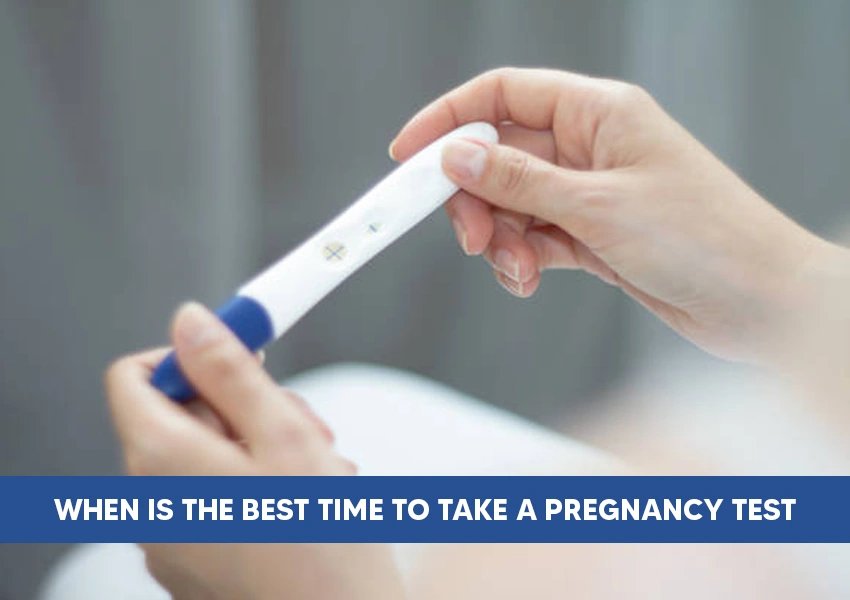When Is the Best Time to Take a Pregnancy Test?
In this article, we will delve into all the information you require regarding the time to conduct a pregnancy test.
Having a pregnancy test is a moment, for women that holds importance in their lives whether you're aiming to get pregnant or simply interested in knowing more about your health status; being aware of the right timing to take a pregnancy test can significantly impact the accuracy of the results you receive. It's not about possessing the test kit. The timing aspect plays a role, in determining the outcome. So when is the ideal time to carry out a pregnancy test for results?
Understanding Pregnancy Tests
A pregnancy test functions by
detecting a hormone known as gonadotropin ( hCG ) in your urine. This
particular hormone is generated once a fertilized egg adheres, to the wall
typically occurring around 6 to 12 days post-conception. These tests are
created to pick up minute levels of hCG though their precision can be
influenced by factors.
Factors That Affect the Accuracy of Pregnancy Tests
The Role of hCG Hormone: Detect pregnancy by checking hCG levels in your urine, which rise quickly in early pregnancy. However, testing too soon might not give accurate results.
The Sensitivity of the Test: Certain pregnancy tests are more effective, at detecting pregnancy at a stage because they can pick up levels of hCG hormone, in the body compared to less sensitive tests that may take longer to show accurate results.
Timing of the Test: Testing for pregnancy soon can lead to a result due, to low hCG levels that may not have reached detectable levels yet. If you wait long to test you might also face issues as the urine sample could be diluted, resulting in results.
Frequency of Urination: When you wait before testing after not going to the bathroom for some time, it usually gives a sample; that's why morning tests are usually suggested.
How Soon After Sex Can You Take a Pregnancy Test?
Just remember that sperm may live in your body for up to five days after penetration and the egg can only be penetrated one day after ovulation. For the most accurate results, it is recommended to wait roughly two weeks after potential conception before taking a pregnancy test.
How Soon Can You Take a Pregnancy Test?
When you take a pregnancy test kit it checks for a hormone known as gonadotropin (HCG) that the placenta releases shortly after the ready implantation of the fertilized egg, to the wall of the uterus.
HCG facilitates the hormone level in your body to increase substantially during pregnancy stages which makes it easy to be detected in urine.
For the results, in testing your
urine for accuracy levels first thing in the morning is usually recommended as
your hCG levels tend to be more concentrated, after an hour of not urinating.
If you choose to test in the day it's advised to restrict your fluid intake to
prevent diluting the hormone.
How long after your period should you take a pregnancy test?
Again, the timing after a missed
period is to wait a week and you can get far more accurate results, as that is
usually when your hCG levels should be high enough, for a test to show
something reliable.
When to Use a Pregnancy Test: Best Time of Day
You tend to get the most accurate results if you test your urine first thing in the morning. That’s because your hCG levels are more concentrated after not urinating for several hours. If testing later in the day, ensure you limit your fluid intake beforehand to avoid diluting the hormone.
When to Test After Missed Period
To get the most accurate results, wait at least a week after your missed period. Your hCG levels should be high enough to detect by this time. If you test too early, you may get a false-negative result if the hormone hasn’t risen yet enough.
Testing Before Your Missed Period
Some pregnancy test kits advertise that you can test positive days before your missed period. Although effective, these initial detection tests are less accurate. Testing too early can yield a very faint line or two lines, an indication the woman is pregnant, or two negative lines, leaving her questioning the results.
Confirming your results
A positive result is usually
accurate, but false positives can happen if you have certain medical conditions
or have recently had a miscarriage. On the other hand, a negative result
doesn’t necessarily exclude pregnancy, especially if you test too early. If you
are unsure, repeat the home test a few days later or see a healthcare provider
for a blood test.
When Should I Take a Pregnancy Test in the Afternoon?
Since it is late at night can you test in the afternoon? It’s still possible, but morning urine is the most reliable as it hasn’t been diluted by fluids during the day. If you have to test in the afternoon, do your best to hold your urine for several hours before testing; this will increase the chances of an accurate result.
When to Test:
A Step-By-Step List Here’s a
timeline that will help you decide the best time to take a pregnancy test after
conception:
●
Day 1–5 after a missed period: Most
tests still won’t be accurate. If you test too early, you’re probably going to
get a false negative.
●
Days 6–10 past the missed period: Seeing a
faint line or a result, potentially positive, dependent on sensitivity.
● Days 10 and beyond: By now the hCG levels in your urine should be high enough to give an accurate result on the majority of tests.
Common Mistakes When Testing for Pregnancy to Avoid:
Some mistakes can skew your results. One mistake, for
example, is testing too early: Testing before your human chorionic gonadotropin
(hCG) levels have elevated can result in a false negative. This often happens
when the instructions are not properly followed; hence, it is important to read
them thoroughly, especially, the recommended waiting time. Testing at the wrong
time of day: Testing in the morning is best, as mentioned above.
How Long After a Missed Period to Test
At least one week after you miss your period, you should take a pregnancy test for best and most accurate results. This gives your body time to produce detectable amounts of the pregnancy hormone, hCG (human chorionic gonadotropin). Although some early detection tests advertise accuracy prior to a missed period, testing too early raises the odds of a false negative. To confirm, if the result is negative and your period has still not started, retest a few days later or consult your doctor.
For reliable results:
Wait at least 10–14 days after
ovulation or until you’ve missed your period.
Early detection tests claim
sensitivity, but testing too soon can still yield uncertainty.
If you suspect you're pregnant and
get a negative result, retest a few days later or consult a doctor for a blood
test, which can detect hCG earlier than urine tests. Patience is key for
accuracy!
How to Get the Most Accurate Result of a Pregnancy Test
Getting an accurate pregnancy test
result depends on timing, technique, and understanding, of how the test works.
Here’s a brief guide:
Use the Test at the Right Time
The most accurate time to take a
pregnancy test is one week after your missed period. This allows your body to
produce enough human chorionic gonadotropin (hCG) for the test to detect.
If you’re eager, some tests can detect pregnancy earlier, but accuracy may be lower.
Test in the Morning
Use the first urine of the day for the test. Morning urine has the highest concentration of hCG, increasing the likelihood of an accurate result.
Check the Expiration Date
Always confirm that the test is within its expiration date. An expired test may provide inaccurate results.
Confirm with a Blood Test
For the most accurate result, consider visiting a doctor for a blood test. Blood tests can detect hCG earlier and with greater precision than home pregnancy tests.
Conclusion
Let’s be clear, timing is key to
testing for pregnancy! To ensure the most accurate results, wait until you’ve
passed your missed period, and try to test with your first urine of the
morning. Early testing is tempting, but it may hold back the answer you’re
searching for. By taking the proper steps, you will maximize the likelihood of
obtaining an accurate result.
FAQs
1. How early can I take a pregnancy test?
It’s not recommended. For optimal
results, you should wait 10–14 days minimum.
2. Does the time of the day matter for pregnancy test results?
Visuals of Morning Urine (explains
also; 8-10) — Yes, morning urine is more buoyant and provides you with the
best results.
3. When can I test after ovulation?
You can test as early as 10–14
days after ovulation, but the accuracy goes up as time goes on.
4. Is it possible for a pregnancy test to be wrong if taken at the correct time?
Yes, false negatives can happen if
the test isn’t done properly or the test has expired.
5. If you miss your period, when should I take a pregnancy test?
For the most accurate results, it’s
recommended to test as soon as you’ve missed your period.


